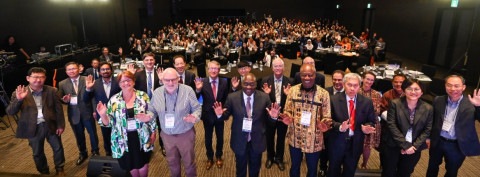
GCED Basic Search Form
Quick Search
You are here
News

5 December 2023
For the first time following the COVID-19 pandemic, more than 200 participants convened face-to-face to explore the challenges and possibilities of putting Global Citizenship Education (GCED) into practice at the 8th International Conference on Global Citizenship Education: Platform on Pedagogy (IConGCED) on October 18-19, 2023, in Seoul, Republic of Korea. The 8th IConGCED, co-organised by APCEIU and the Ministries of Education and Foreign Affairs of the Republic of Korea, in partnership with UNESCO, centred on the theme “Unpacking GCED: Transformative Learning for Critical Empowerment.”
This year’s conference addressed topic areas such as implementing innovative pedagogical approaches and GCED competences to contribute to transformative learning and critical empowerment, adapting school and classroom GCED practices in diverse settings, and advancing a culture of peace through GCED and the necessary types of advocacies, policies, and partnerships. The conference invited GCED experts, scholars, policymakers, educators, practitioners and others to discuss and explore key issues while also sharing innovative initiatives and practices. In particular, the conference focused on the multidimensionality and interdisciplinary nature of GCED and issues around the practicality and possibility of integrating GCED competences into innovative curricular content and pedagogical practices. The conference facilitated the sharing of ideas and experiences between in-person participants as well as over 2,500 online participants, contributing to emergent discourses around transformative education and strengthening levels of commitment, solidarity, and cooperation.
On the first day, opening remarks highlighted the interconnectedness of today’s world and, thus, the interconnected and wide-ranging challenges that require critical engagement and collective action. Christopher Castle, director of the Division for Peace and Sustainable Development, UNESCO, stated, “Learners need the knowledge, skills, and values to engage critically with the world” and, therefore, “global citizenship education, like education in general, needs to be reinvigorated to be transformed.”
Dr. Lim Hyun Mook, director of APCEIU, extended this sentiment with an urgent call to unite under GCED ideals while still respecting the diversity of experiences and understanding of GCED. In his keynote speech, Minister of Education and Sports of the Lao People’s Democratic Republic H.E. Phout Simmalavong shared the achievements of the Lao GCED framework, inspiring attendees to think critically about how to implement GCED-related activities in local contexts.
Following the opening ceremony, the first plenary session was a moderated conversation about the multidimensionality of GCED in the face of violence and climate change. Significant topics of discussion were naming and understanding the components of empathy, the connection between climate change and other economic and social issues, and the value of using empathy education to address climate issues and promote global citizenship. Key takeaways included the positive benefits of using empathy education as a tool for violence prevention and to support the goals of climate justice, the need for new and more holistic approaches to address the climate crisis, and the importance of reframing climate change education as a community issue for global eco-citizens.
In the second plenary session, presenters provided models for integrating GCED “Competences” into educational frameworks and systems for transformative learning, critical empowerment and social engagement. Participants also discussed the values, attitudes, skills, and knowledge that accompany GCED “Competences” and the challenges of getting “buy-in” from governments and countries. All panellists emphasised the need to adapt GCED frameworks to the specific local, community, regional, or country contexts going forward and that it is important to understand the various aspects of a learner when seeking to transform the curricular and assessment systems.
The third plenary session was a panel-style discussion about the need to transform education and the successes and failures thus far. Ghana, for example, has been conducting an ongoing curriculum review to ensure a focus on transformative learning and develop teachers’ understanding of global citizenship. Panellists also discussed what is required to transform education, including reforming policies, raising public awareness and advocacy, developing extensive teacher training, using whole-school approaches, and engaging all actors in the transformation efforts. Panellists reiterated that the constantly changing world means learners need to be adaptable and resilient in order to be active and responsible global citizens. Crucially, panellists discussed how GCED has contributed to transformative education by highlighting the need for continuous evaluation and adaptation and showing that transforming education should be done in a holistic and comprehensive manner, tying it to broader social, political, and economic contexts.
On the second day of the conference, concurrent sessions were held under various themes relating to the curricular integration of GCED, lifelong learning, tertiary and pre-service education, GCED competences for educators, youth as change agents, and rethinking GCED monitoring. The sessions included a workshop on GCED storytelling for transformative learning, as well as presentations on transformative pedagogies of empowerment, innovative teaching pedagogies and GCED resources to support teachers.
To close the conference, select participants presented key takeaways from each of the concurrent sessions, including:
- Empathy, soft skills, and capacity building are crucial for countries to implement GCED.
- Engaging in community partnerships enables teachers to better implement GCED.
- APCEIU provides useful materials and resources to support teachers and educators in implementing GCED and transformative learning.
- Several adjustments should be made to improve GCED monitoring at the national, regional, and global levels, including establishing new reporting and monitoring platforms.
- Art and storytelling can be effective mediums to promote peace and transformative learning.
- Engaging and empowering youth participation is critical for promoting GCED.
Closing remarks were given by Director Castle and Director Lim, who were impressed and encouraged by the stories and discussions that occurred over the two-day, in-person conference. Director Lim concluded his remarks with a reminder that UNESCO will soon adopt the revised 1974 Recommendation and expressed his belief that this will give significant momentum to convince governments, policymakers and community leaders of the necessity and power of GCED to influence change in the face of uncertain and dangerous times. The 1974 Recommendation provides a fresh view of the purpose and shared vision of education moving forward.
